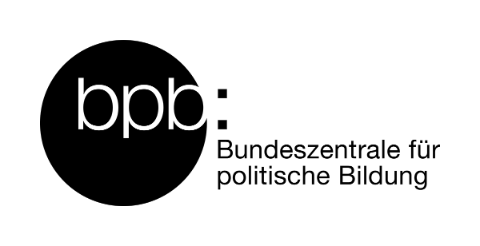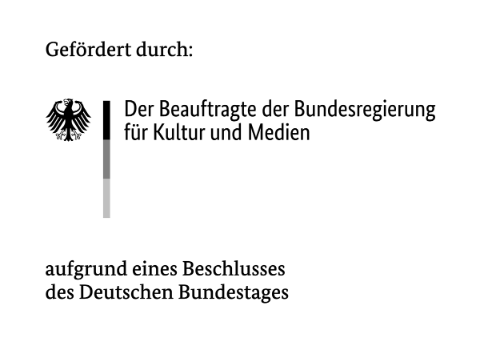Who Does Germany Belong To?
The heimaten Podcast from Haus der Kulturen der Welt
Podcast

Who Does Germany Belong To? Podcast
German society is the result of a collective merit. It emerges out of the interplay of the joint and diverse contributions of all those who live in this country. Nevertheless, this fact is often forgotten or even denied today, increasingly by people in positions of power.
Who does Germany belong to? In eight podcast episodes, Max Czollek and his guests shed light on different perspectives and concepts of belonging in a plural society. The dialogue creates an archive of home and resistance, reminding us that these discussions are not new and that strategies have already been found in the past that can be taken further today.
The podcast accompanies a series of talks titled Heimatization—On Belonging and Plurality, which take place at Haus der Kulturen der Welt from March to November 2025. It delves into the issues discussed there, opens up new perspectives, and explores how a society can be imagined in which everyone can be at home and not just some.
All episodes:
Episode 8: So Who Does Germany Actually Belong To?
With Max Czollek and Linus Westheuser
In the eighth and final episode of the podcast Who Does Germany Belong To?, Max Czollek speaks with Linus Westheuser about ownership structures. Westheuser, a dry poet, holds a PhD in sociology and from 1 January 2026 is a senior researcher at the Max Planck Institute for Social Studies in Göttingen. What is the connection between increasingly elite-oriented policies and the migrantization of political debates? What does a growing sense of uncertainty and the dysfunction of public institutions have to do with the dismantling of ‘social property’ (Robert Castel)? How does this perspective relate to the issues of antidiscrimination previously discussed on this podcast? And what might progressive politics—politics that address the concerns and problems of the majority while also (re)thinking the project of justice and equality—actually look like?
Episode 8 [German only]: audio in the HKW Mediathek, audio on Podigee and other podcast platforms
Episode 7: 40 Years of Initiative Schwarze Menschen in Deutschland
With Max Czollek, Anna Yeboah, and Tahir Della
In episode 7, Max Czollek speaks with Anna Yeboah, curator of Dekoloniale Berlin, architect, and activist, and Tahir Della, activist in the ISD (Initiative Schwarze Menschen in Deutschland, or Initiative of Black People in Germany). On the occasion of the forty-year anniversary of the ISD, they address the history and political agenda of the initiative as well as forms of self-organising and resistance. What has the ISD achieved over the course of the last few decades? What sorts of challenges is it confronted with today? What are its visions for the future? And how does one manage to stay united for over forty years? Yeboah and Della provide the kind of answers everyone needs.
Episode 7 [German only]: audio in the HKW Mediathek, audio on Podigee and other podcast platforms
Episode 6: Anti-Fascism as Concrete Utopia
With Max Czollek and Jean Peters
In episode 6, Max Czollek speaks with investigative journalist, author, and tactical media artist Jean Peters, about anti-fascism as a utopia and the attempt to fight for a plural and resilient democracy through different strategies. Drawing on their shared background in political science and their work across various theatres, they discuss political action art, journalistic practice, and the ongoing redefinition of their self-conception. How has the impact caused by the Correctiv-investigation on the Secret Plan Against Germany (Geheimplan gegen Deutschland) evolved two years after its public disclosure? What does ‘anti-algorithmic journalism’ mean in a theatrical context? And how can clown training possibly assist in navigating the political present?
Episode 6 [German only]: audio in the HKW Mediathek, audio on Podigee and other podcast platforms
Episode 5: Is That a Thing? Colonialism and the Present
With Max Czollek, Ibou Diop, and Raphaëlle Red
In episode 5, Max Czollek is joined by two guests: Ibou Diop, co-curator of heimaten, and Raphaëlle Red, author and researcher. Their discussion focuses on the ongoing relevance of colonialism, whose global impact stretches deep into the past and cannot be told without the stories of suffering, survival, and resistance of those affected. Together, the three ask: how can colonial continuities be overcome when their history is still systematically obscured? What role can literature and other artistic practices play in achieving this? Doesn’t Germany also belong to its former colonies? And must a better future be imagined and narrated before it can be realized?
Episode 5 [German only]: audio in the HKW Mediathek, audio on Podigee and other podcast platforms
Episode 4: Empowerment and Resistance: Sinti and Roma since 1945
With Max Czollek und Kelly Laubinger
In Episode 4, Max Czollek speaks with Kelly Laubinger, activist and managing director of the Sinti Union Schleswig-Holstein, about strategies of resistance developed by Sinti* and Roma* communities since 1945. They discuss the vitality of these communities, as well as the long history of structural discrimination and persecution. What does anti-Sinti* and Roma* racism mean, both historically and today? What role do self-organized initiatives play in resistance and remembrance? And why are political alliances so crucial today—to share in collective anger, and to transform that energy into meaningful change?
Episode 4 [German only]: audio in the HKW Mediathek, audio on Podigee and other podcast platforms
Episode 3: Disintegration: Against Jewish Tokenism
With Max Czollek and Sasha Marianna Salzmann
In episode 3, Max Czollek talks to playwright and novelist Sasha Marianna Salzmann about the concept of disintegration: about its origins at the Maxim Gorki Theatre in Berlin and its role as an alternative approach to established notions of Jewish identity in Germany and beyond. Is disintegration an attempt to create a ‘post-migrant Jewishness’? Why did this work unfold in a theatre rather than in the German parliament, the Bundestag? What role do anniversaries such as the Victory in Europe Day on 8 May play? How has the meaning of disintegration shifted since Russia's invasion of Ukraine? And what can and should disintegration look like in 2025?
Episode 3 [German only]: audio in the HKW Mediathek, audio on Podigee and other podcast platforms
Episode 2: (Post) East German?
With Max Czollek and Sergej Prokopkin
In episode 2, Max Czollek talks to Sergej Prokopkin, legal trainee and anti-discrimination trainer, about the Post-Ost concept he helped to develop: about Post-Ost as a space for empowerment, but also as a platform for progressive forces in the Post-Ost communities. Who can take part in Post-Ost and how can the plurality of communities be brought together without being homogenized? What is anti-Slavism and what alternative does Post-Ost propose? And how does Post-Ost take up existing models of anti-discrimination—and develop them further into an urgently needed progressive political practice?
Episode 2 [German only]: audio in the HKW Mediathek, audio on Podigee and other podcast platforms
Episode 1: The Post-Migrant Decade
With Max Czollek and Naika Foroutan
In episode 1, Max Czollek talks to Naika Foroutan, Professor of Integration Research and Social Policy at Humboldt University in Berlin, about the past post-migrant decade: about the origins of the term ‘post-migrant’ in theatre and art as well as its political relevance. Is the post-migrant era already coming to an end? Was the focus on diversity in many areas of society just a fad? Or is the relevance of post-migrant approaches now becoming more apparent? Max Czollek and Naika Foroutan categorize the achievements and challenges of the post-migrant movement and ask what working for plural democracy could look like in the future.
Episode 1 [German only]: audio in the HKW Mediathek, audio on Podigee and other podcast platforms
Funded by the Federal Agency for Civic Education (Bundeszentrale für politische Bildung / bpb)
Part of heimaten, supported by the Federal Government Commissioner for Culture and the Media due to a ruling of the German Bundestag

